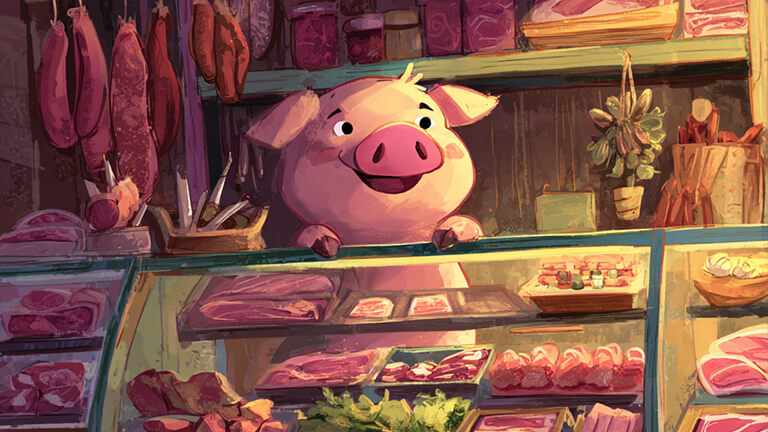Pig products#

Pigs produce several types of useful products and can be used as a standalone commodity, earning gold coins. The type and amount of income depend on the age, weight, and purpose of the animals.
Main sources of income#
- Pork production.
- Bacon production.
- Obtaining pig manure.
- Birth of piglets.
- Exchange of young boars for state farm coupons.
- Lease of breeding boars for gold coins.
- Selling pigs at the fair.
- Prizes for sporting achievements of boars.
Pork production#
The amount of pork depends on the age and weight of the animal.
- Up to 100 days inclusive, 50% of the carcass weight is obtained.
- From 101 to 350 days, the meat yield decreases proportionally and on the 350th day is 0 kg.
Calculation formula for age over 100 days:
\( W = (m / 2) • (350 − A) / 250 \)Formula variables:
| Variable | Explanation |
|---|---|
| \( m \) | Weight of the animal when butchered. |
| \( A \) | Animal age, days (100 < A < 350). |
Bacon production#
To obtain bacon, the animal is delivered to a butcher’s shop. The cost of processing one carcass is 2 gold coins.
Basic conditions:
- Age from 101 to 350 days inclusive.
- Gender and weight do not matter.
- Bacon is not produced for up to 100 days.
- After 350 days, surrender is only possible with the Porcus Guard NFT.
The amount of bacon increases proportionally from 0 kg on the 100th day to 50% of the carcass weight on the 350th day.
Calculation formula:
\( W = (m / 2) • (A − 100) / 250 \)Formula variables:
| Variable | Explanation |
|---|---|
| \( m \) | Weight of the animal when butchered. |
| \( A \) | Animal age, days (100 < A < 350). |
Pig manure production#
All pigs produce manure, regardless of sex, age, and weight. The amount produced depends on the age group and the quality of the feed.
Table. Pig manure production
| Age, days | Manure, kg per day |
|---|---|
| 1–30 | 0.1 → 8 |
| 31–350 | 8 |
| 351–380 | 8 → 0.1 |
Rules for manure production:
- Maximum values are achieved with optimal feeding.
- If the diet is inadequate, the volume decreases proportionally.
- During fasting, no manure is produced.
Pig manure is used to produce the fertilizer “Pig Breeze.” Processing is performed in the “Livestock → Manure and Fertilizers” section.
The cost of processing is significantly reduced if you have a pigsty. Manure and finished fertilizer can also be sold at markets.
Exchange of boars for state service coupons#
Boars up to 30 days old can be donated to the state farm nursery.
Exchange rules:
- One coupon is issued for every 1 kg of weight.
- Exchange is possible only for boars.
- Sows cannot be exchanged.